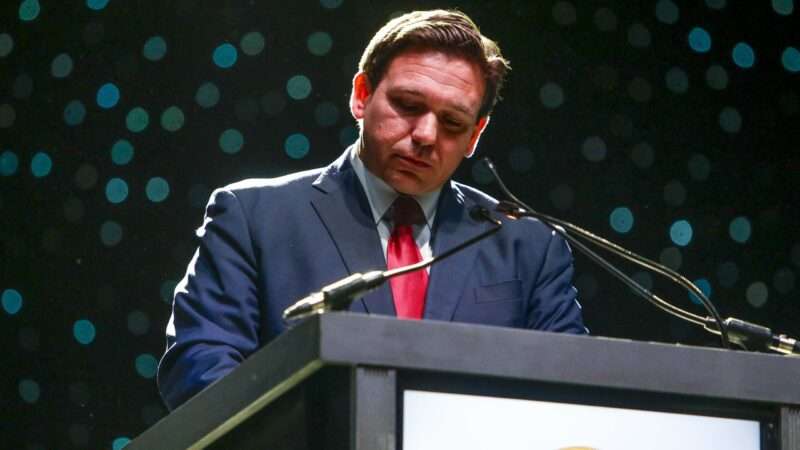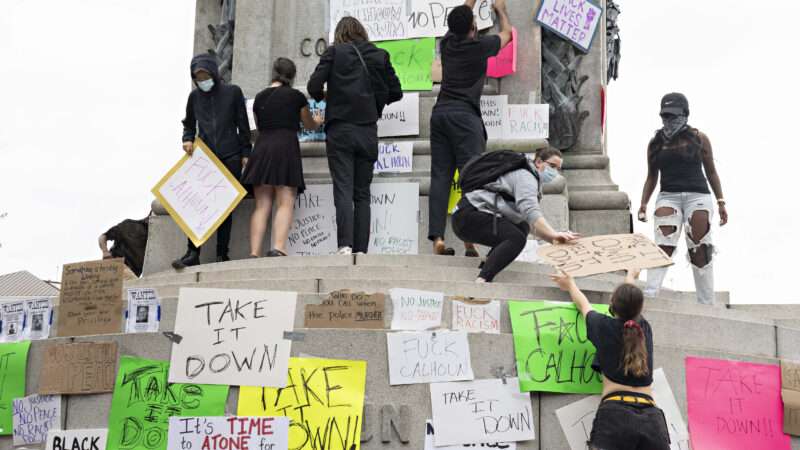During a debate last month, Don Bolduc, a retired U.S. Army brigadier general who was seeking the Republican nomination to oppose Sen. Maggie Hassan (D–N.H.) in November, unambiguously asserted that Donald Trump won the 2020 presidential election. “I signed a letter with 120 other generals and admirals saying that Trump won the election, and, damn it, I stand by my letter,” Bolduc said, eliciting cheers and applause from the audience. “I’m not switching horses, baby. This is it.”
Yesterday, two days after Bolduc won the Republican Senate nomination, he suddenly renounced that reality-defying position. “I’ve done a lot of research on this,” he said on Fox News, “and I’ve spent the past couple weeks talking to Granite Staters all over the state from every party, and I have come to the conclusion—and I want to be definitive on this—the election was not stolen….Elections have consequences, and, unfortunately, President Biden is the legitimate president of this country.”
That startling reversal starkly illustrates the challenge that Republican candidates face in a party that has been organized around one man’s self-flattering delusions. They recognize that reinforcing those delusions gives them an edge among Republican primary voters, as reflected in the positive response to Bolduc’s fiery comments during that August 14 debate and in Tuesday’s election results. But they also understand that endorsing wacky conspiracy theories is apt to alienate moderates and independents in a general election. That prospect is especially worrying in a purple state like New Hampshire, where registered Republicans have only a slight edge over registered Democrats and two-fifths of voters are unaffiliated.
Bolduc’s solution is both audacious and risky. As recently as a month ago, more than a year and a half after the 2020 election, he claimed to be firmly convinced that systematic fraud had delivered a phony victory to Joe Biden. But since then, he says, a combination of “research” and conversations with New Hampshire voters has persuaded him that Biden actually won. The excuse he offered on Fox News was less than completely satisfying: “Live and learn, right?”
Any voter who does not share Bolduc’s devotion to Trump might reasonably wonder why the candidate did not bother to research this subject before publicly, repeatedly, and confidently insisting that the election had been stolen. In the 21 months that elapsed between the election and last month’s debate, there was plenty of time to weigh the evidence in favor of that politically explosive and socially divisive proposition. But even after the claim that Bolduc endorsed drove a violent mob of Trump supporters to attack the U.S. Capitol in a vain attempt to prevent Biden from taking office, Bolduc wants us to believe, he did not bother to investigate the empirical basis for that claim.
That explanation suggests Bolduc is reckless, feckless, dishonest, or all three. New Hampshire voters will have to decide whether those qualities recommend him as a member of the U.S. Senate. He is counting on them to overlook the implications of his excuse.
If that strategy works, the Senate Majority PAC will look pretty foolish for spending millions of dollars on ads aimed at boosting Bolduc and hurting his chief rival, New Hampshire Senate President Chuck Morse (R–Salem), who lost on Tuesday by a bit more than one percentage point. Morse, the establishment’s favorite, was endorsed by New Hampshire’s Republican governor, Chris Sununu, who described Bolduc as a “conspiracy-type candidate.” But as in Maryland, Pennsylvania, and Michigan, the Democrats figured the Trumpiest candidate would be the easiest to beat in the general election.
Bolduc deserved that distinction. But judging from the August 14 debate, his rivals were also terrified of alienating Trump supporters by challenging the stolen-election fantasy. Here is the question that prompted Bolduc to reiterate the conviction he has now repudiated: “Do you believe that we can conclusively determine who won the 2020 presidential election, and what role should the federal government play in getting to the bottom of it or handling our elections, if any?”
Two of Bolduc’s opponents for the Republican nomination, cryptocurrency entrepreneur Bruce Fenton and Londonderry Town Manager Kevin Smith, a former state legislator, also participated in the debate, which was sponsored by the Government Integrity Project, a conservative group based in Windham, New Hampshire. Fenton and Smith were less bold than Bolduc, trying to placate Trump’s followers without sounding crazy. But their professed agnosticism made it clear that they did not have the courage to say which universe they inhabit: the one where Biden legitimately won the election, notwithstanding whatever scattered fraud may have occurred, or the one where fraud—including the orchestrated, multistate manipulation of voting machines by an international cabal that faked hundreds of thousands or millions of votes—was so systematic that it denied Trump his rightful victory.
Once he won the nomination, Bolduc felt secure enough to renounce his residency in the latter universe. But before then, he proudly lived there. Fenton and Smith, by contrast, tried to straddle both worlds.
After a stammering start, Fenton averred that there were “massive, massive issues” with the election, to the extent that “we can’t tell what’s true.” Fenton then tried to shift attention to social media moderation policies, reinforced by government pressure, that suppress false claims about the presidential election, saying “they’ve censored it, just like a third-world dictatorship.”
Fenton called the question of who won the election “one of the most partisan issues there is,” noting that “people on the left” get “outright angry” at the claim that Trump did. He added that “everybody, on the right and the left, should agree that the elections are fair, and if they’re not, it’s a serious problem we absolutely must address.”
When pressed to say whether it is clear who won the 2020 election, Fenton replied, “No, because we don’t have the information. We can say that there was a lot of fraud. There was a lot of problems, for sure, absolutely.”
Smith attempted the same sort of balancing act. “It’s very unlikely that Joe Biden got 81 million votes,” he declared. “Unfortunately, we may never have a full accounting of exactly what happened, because, again, they’re not allowing the investigations to occur. We know there were irregularities right here in Windham…but we never got a full investigation into what’s going on here. We saw the same thing in Bedford as well.” If elected to the Senate, he promised, he would make sure that “we will have investigations into all of these irregularities, because election integrity is a pillar of our democratic republic.”
Morse did not participate in the Government Integrity Project’s debate. But during a September 8 debate sponsored by WMUR, the Hearst station in Manchester, he agreed with Trump that the FBI’s investigation of purloined government documents at Mar-a-Lago had been “politicized.” He added that “we need to investigate the management” of the FBI and the Justice Department.
Although Morse’s record is pretty conservative, he was frequently described as a “moderate” compared to Bolduc, mainly because his support for Trump was not fervent enough to make him embrace wild claims that were rejected by election experts, the courts, and a wide array of Republican officials, including Trump’s own attorney general. By that standard, Fenton and Smith are also moderates, since their cowardly kowtowing to Trump’s followers stopped short of declaring Biden an illegitimate president.
Bloomberg Opinion columnist Jonathan Bernstein suggests that Bolduc’s about-face presents Trump with a challenge. “While the former president’s grip on the Republican Party is partly based on how helpful he can be to candidates seeking nominations,” he writes, “the main reason Republicans fear him is the possibility that he could turn against them in November, either by asking voters to stay home or even [by] suggesting they vote for GOP candidates’ Democratic or third-party rivals.” If Trump never actually does that, Bernstein argues, Republican candidates will be less afraid of crossing him.
“Bolduc seems like a very good test case, given that Trump didn’t endorse him in the primary and that his reversal was so complete and total,” Bernstein writes. “If Trump supports him anyway, or even if he just ignores the whole episode, people in the party inclined to oppose him but hesitant about the political cost will be more likely to think of him as a paper tiger.”
That seems like wishful thinking to me. A large majority of Republican voters—75 percent or more, according to several polls—are still unwilling to concede that Biden legitimately won the 2020 election. As long as the selection of candidates depends on placating Trump supporters, Republicans will continue to obfuscate or deny a basic historical fact.
The post A Senate Candidate's Belated Acknowledgment of Biden's Victory Is a Reality Check for a Trump-Dominated GOP appeared first on Reason.com.
from Latest https://ift.tt/Q8MPV3m
via IFTTT







